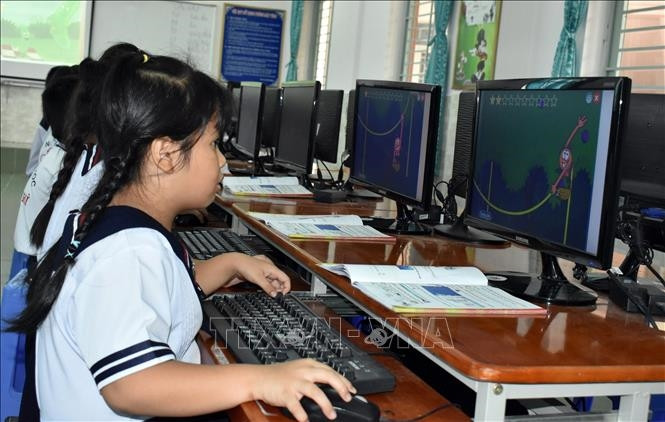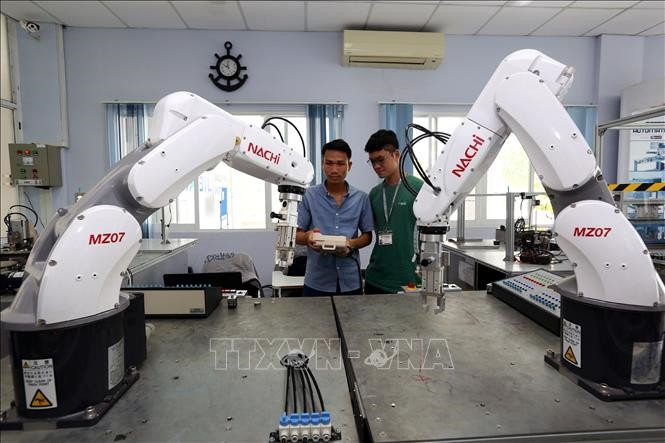Digital transformation is considered an important solution in innovating management methods and motivation to improve the quality of education and training.

An IT lesson for students at Tan Son Nhi Primary School, Tan Phu District - one of the schools implementing the advanced school model. Photo: Thu Hoai/VNA
The application of technology opens up many new, smart and effective teaching methods, eliminating barriers of space and time for teaching and learning activities. In Ho Chi Minh City, the digital transformation process in the Education and Training sector is being carried out strongly, but it is still lacking in synchronization, besides the limitations in facilities and staff capacity.
Applying technology in all activities
As one of five schools in the city piloting the smart school model, from the 2021-2022 school year, Le Hong Phong High School for the Gifted has gradually built a smart school, smart classroom combined with digital transformation in education. Accordingly, the school increases the application of information technology and artificial intelligence in automation and digitalization of management and learning activities. The school maintains an online teaching system to have more channels for regular interaction. Online storage applications are utilized for subject groups and teachers to centrally store lectures and common resources, aiming to build an open learning resource system for the school.
The internet system, internal server, equipment and machinery are invested to meet operational requirements; in particular, the virtual classroom system has full applications to meet the needs of teaching and learning as well as management. SchoolHigh SchoolLe Hong Phong High School is the first school in the city to implement mass artificial intelligence teaching for all students.
Ms. Pham Thi Be Hien, Principal of the School, said that due to the lack of previous pilot models, the school has adopted the policy of both research and implementation in the process of implementing the above contents. The school has identified that the team is an important factor in determining the effective implementation of digital transformation activities. Therefore, in addition to training cadres, teachers and employees in information technology and foreign languages, the school has signed contracts with a number of artificial intelligence experts to teach and train teachers on-site. The school has signed cooperation agreements with a number of foreign schools to exchange and learn from each other's experiences.
In the coming time, the school will implement many digital transformation projects such as: Student attendance system through facial recognition; building learning materials according to open standards; applying AI to build a scoring, ranking, evaluating, and monitoring system for student capacity; deploying an app system for notification and exchange between teachers and students...
Many schools in the city have strongly applied information technology and digital transformation in management, teaching and learning at different levels depending on the actual conditions of each school. The survey results on the educational technology readiness index at school facilities announced by the city's Department of Education and Training show that 88% of schools in the area have a digital strategy or plan to combine the use of information technology in teaching and school management; 82% of students use digital devices safely and appropriately. Notably, 78% of students improve their learning process thanks to the use of information technology. On the teachers' side, 77% of teachers said they are very confident in preparing presentations for use in class, 73% use information technology to evaluate students' learning outcomes and 64% use shared resources on the internet...
Along with the implementation in each school unit, the city has deployed the overall architecture of information technology application in the city's Education and Training sector. This is an important basis for connecting software systems, creating an effective shared database for the entire sector. Up to now, the city has completed the shared database at all levels of education; piloted 12 online teaching software with content exploited from this shared data warehouse. This data is the basis for the sector to be able to forecast the situation and overcome the shortage of schools and teachers in the coming years.
Promoting learning in digital environments

Students practice programming and operating robots at SHTP-Traing. Photo: Danh Lam/VNA
Digital transformation has been carried out by most educational institutions in the city, but implementation still faces difficulties. Staff capacity is limited and not ready for digital transformation. Open learning materials are limited. Information technology infrastructure and equipment do not meet the requirements for synchronous digital transformation activities.
One of the great achievements of digital transformation is organizing online teaching combined with direct teaching, especially in the context of the COVID-19 pandemic, the application of information technology in teaching and learning activities helps the education sector to be able to fulfill the requirement of not stopping going to school but not stopping learning.
However, Deputy Minister of Education and Training Nguyen Van Phuc said that implementing online learning programs during the COVID-19 pandemic is just one of the very simple forms of digital transformation. The goal of digital transformation that the education sector is aiming for is to build a truly intelligent online learning system, with full learning materials and learning management to help students and teachers learn and teach proactively, supplementing direct learning as well as improving the quality of teaching and learning. To build a complete system, specific, synchronous projects are needed and coordination and implementation roles are needed at the provincial and municipal levels.
According to the City Department of Education and Training, the digital transformation program in the education sector has been vigorously implemented, but because this is a new issue and there is no standard model, the industry has to research, explore and adjust during the implementation process, so the results have not yet been as expected. The application of technology in education still has many shortcomings when the technology infrastructure is not guaranteed. According to the survey, only 70% of schools have sufficient bandwidth or internet speed, of which 67% of schools have stable internet connection. Despite having access to enough digital learning resources, only 42% of teachers said that digital resources are linked to textbooks, 35% of teachers use digital learning games...
“Digital transformation is the leading important solution in innovating leadership methods, a tool to create breakthroughs in administrative reform, improve the investment environment, and an important goal and driving force in improving the quality of education in the city. This is one of the key tasks that the industry will continue to focus on implementing in the coming time. In particular, training and fostering digital skills for the team is the first solution that the industry focuses on, along with building and developing digital data; focusing resources on investing in infrastructure to meet the requirements of applying information technology in management and teaching in all educational institutions. Currently, the city has deployed the construction of an overall architecture for applying information technology in the education sector. This is an important basis for connecting and creating an effective shared database for the entire industry,” shared Mr. Nguyen Van Hieu, Director of the Department of Education and Training of Ho Chi Minh City.
The digital transformation program to 2025 and orientation to 2030 in the city's education sector focuses on three major contents, including: Building an asynchronous learning system and an open science repository as a foundation for building a learning society; using AI to analyze, evaluate, and provide general orientation in the sector; applying Blockchain in managing, authenticating, and connecting scores and diplomas. Notably, by 2025, the city will make teaching and learning in the digital environment an essential educational activity, with 25% of primary school programs and 35% of secondary school programs being implemented online. By 2030, the city will bring all elements of the education system into the digital environment.
According to VNA